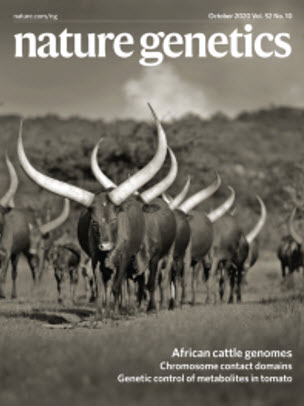
October 2020 edition of Nature Genetics, courtesy of Nature Publishing Group
Kwondo Kim, a former student of Professor Heebal Kim (Department of Food and Animal Biotechnology), is currently a researcher at the National Institute of Health, an agency of the U.S Department of Health and Human Services. During his time at Professor Kim’s lab, BIOPOP, Kwondo Kim’s thesis revolved around African pastoralism, and his paper titled, “The mosaic genome of indigenous African cattle as a unique genetic resource for African pastoralism,” was recently published in Nature Genetics. Here, we take a closer look at the illuminating work that goes on in BIOPOP, the motivations behind this study, and the growing importance of international collaboration within the scientific community.
The following is an excerpt from Kwondo Kim’s interview with the Biological Research Information Center (BRIC).
Could you provide for the readers an introduction of your field of research?
While there is a wealth of knowledge regarding the genetics of cattle reared in Western civilizations, artificial selection due to their mass production has severely reduced their biodiversity. In sharp contrast, there are over 150 breeds of indigenous cattle across the African continent, each with unique phenotypic and adaptive characteristics, and much about their genetic information remains to be discovered. In 2013, our group, together with several research teams from various international research institutes, set out to understand this incredible biodiversity at a genetic level.
Through whole-genome sequencing and admixture mapping of 12 indigenous African cattle populations and African buffalos, we found that a combination, or admixture, of two ancestries, the Bos taurus and Bos indicus, were at the root of the success of African pastoralism. Admixture mapping is a critical technique to map the genetic information and history in a population of mixed ancestry, and can be seen as the future of population genetics. We were able to identify critical single-nucleotide polymorphisms as well as date the ‘taurine x indicine’ admixture event through admixture mapping. Without this technique, such analysis would not have been possible as interbreeding between cattle lineages causes a sort of ‘entanglement’ of genetic information that is easily unwound through admixture mapping.
Our study was not without its ups and downs. When we were finally ready to submit our research to press, a new bovine reference genome had been published, making us wonder whether we had to redo our analysis with reference to this genome. After a lot of discussion amongst ourselves, we decided to conduct analysis with both the new and former reference genomes. Having to employ twice the computing resources was not easy, but it helped us to complete our revisions more quickly, so it turned out to be a good experience.
Tell us more about BIOPOP
BIOPOP, or the Laboratory of Bioinformatics and Population Genetics, is led by Professor Heebal Kim from the College of Agriculture and Life Sciences. In Professor Kim’s lab, we studied the population genetics of important livestock animals, constructed their genome assemblies, and also developed databases and useful bioinformatics tools. One of the advantages of being a part of the lab is the wide spectrum of research being conducted. BIOPOP is the only Korean research team to participate in the Vertebrate Genomes Project (vertebrategenomesproject.org) and with our Professor also being an organizer of the African cattle genome consortium, we have many opportunities to collaborate with research teams from all over the world. During the course of this study, I was able to work as part of the C&K Genomics company, which has an assortment of cutting-edge research tools and techniques that facilitated quick and efficient research. I’d like to take this opportunity to extend my gratitude to C&K Genomics once more.
What keeps you going as a researcher?
I get easily stressed when I do research, and before publishing I was extremely anxious. What kept me going was the simultaneous excitement for the potential implications of my research and the feeling of accomplishment as everything slowly began to fall into place. I’m sure other researchers feel similarly.
What advice do you have for those who are interested in pursuing research in this field, or those who are planning to study abroad as you are currently? That’s a tough question. The research that I am interested in is not common in Korea, and so it can sometimes feel insignificant, but at other times it makes it that much more special. It depends on one’s style.
What are your plans moving forward?
I plan to pursue further research in population genetics, and continue to learn more about African pastoralism. At present, I am a postdoc at the National Institute of Health, combining machine learning with whole-genome sequencing. By expanding my skill set, I believe I will be able to conduct more meaningful research.
Do you have any closing remarks?
First and foremost, I would like to extend my deepest gratitude to Professor Heebal Kim. Professor Kim has given me invaluable opportunities and help in ways that are impossible to describe.
I would also like to thank Professor Olivier from the International Livestock Research Institute (ILRI) for his help in writing the manuscript, Taehyung Kwon for our spirited discussions and debates, Professor Choongwon Jeong for elevating the quality of every aspect of our study, IRLI researchers for help in sampling, African researchers and everybody else who contributed to this study.
Thank you to my parents for their unconditional support. And most of all, thank you to my wife, whom I love dearly, for always being so indulging when I drone on about my research, and who shares my successes as her own.
Written by Cheesue Kim, SNU English Editor, cheesue@snu.ac.kr
Reviewed by Professor Travis Smith, Department of Asian Languages and Civilizations, tlsmith@snu.ac.kr

